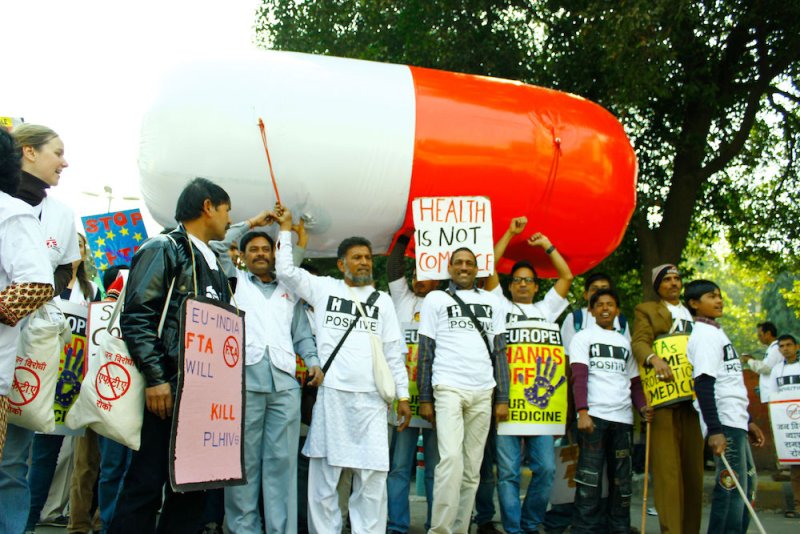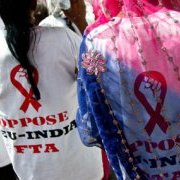- Negotiations

The European Union and India launched negotiations on a bilateral free trade and investment agreement in June 2007. However, between the governments, a number of controversies have been plaguing the talks. Delhi wants Brussels to relax its stringent food safety criteria which penalise Indian farm and fishery exports and to make it easier for Indian professionals to work in the EU. Europe is primarily out to win major openings of India’s services sector and broad liberalisation of foreign investment, while India does not want to discuss allowing European firms to compete in India’s government procurement market.
Indian social movements, including fisherfolk and labour unions, people living with HIV/AIDS and other health activists have been mobilizing against the FTA. International actions and campaigns have particularly targeted the proposed intellectual property provisions of the agreement, and the impact of the FTA on access to medicines.
last update: May 2012
Photo: MSF
11-Apr-2013
Germany has voiced its support for an early conclusion of the long drawn out negotiations between India and the European Union on a free trade agreement, saying the move will be in the interest of both countries.
11-Apr-2013
Firstpost
A large number of people living with HIV, cancer patients and health activists took to the streets of Delhi today asking government of India not to sign a Free Trade Agreement (FTA) with the European Union (EU) as it would be detrimental to the interests of tens of thousands of people like them in the country.
10-Apr-2013
Indian Express
Prime Minister Manmohan Singh and German Chancellor Angela Merkel are likely to find large unfinished paragraphs in their India-EU free trade agreement when they meet this week.
10-Apr-2013
Hindu Businessline
Indian auto industry body Society of Indian Automobile Manufacturers (SIAM) on Monday came with a White Paper on the India-European Union Free Trade Agreement (EU-FTA). It has said the pact will curtail investments in automotive manufacturing in India and, consequently, employment opportunities.
10-Apr-2013
Infojustice
We, Cambodian garment workers, sex workers, entertainment workers, people living with HIV, LGBTs, university students, feminists and human right activists from different networks and organisations came together to express our concern about the threat posed by the forthcoming EU-India free trade agreement to the lives of millions of people in Cambodia and many other developing countries across the world.
9-Apr-2013
Around 2000 people including people living with HIV (PLHIV), patient groups and public health activists will take to the streets and rally from Barakhamba road to Jantar Mantar at 11.00 am on 10 April 2013 to voice concerns and protest against harmful provisions being pushed by the EU-India FTA negotiations
7-Apr-2013
Increasing the insurance cap by India is virtually a "must" for inking of the long-pending India-European Union FTA, which has seen 15 rounds of negotiations since its launch in 2007.
7-Apr-2013
The Communist Party of India (Marxist) has expressed deep concern about negotiations on the Bilateral Trade and Investment Agreement (BTIA) between the European Union and India proceeding without any Parliament or other democratic institutions scrutinising it.
1-Apr-2013
LiveMint
The gains accruing to the Indian generic drugs industry as a result of the Supreme Court judgement on the Novartis case may be lost if India accepts demands by the European Union (EU) under the proposed free trade agreement (FTA) between the two sides.
30-Mar-2013
In a move that could spell relief for the domestic auto industry, India may not offer the European Union (EU) a sharp customs duty cut to 10-30 per cent for imported premium cars as previously envisaged under the upcoming free trade agreement (FTA).










